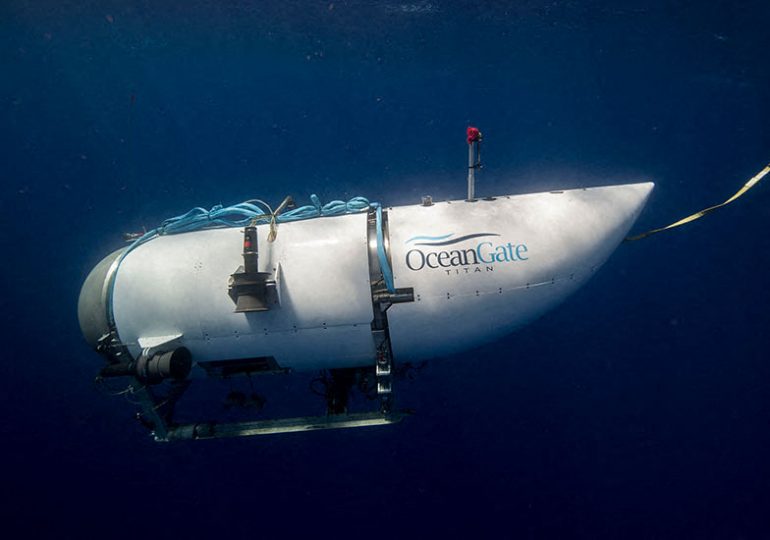DOOMED Titan sub passengers died needlessly as OceanGate refused to listen to obvious safety issues, a leading sea explorer says.
Five men – including the company’s CEO Stockton Rush – were killed instantly when the unclassed sub imploded almost one year ago.
The Mega AgencyThe Titan sub imploded almost one year ago[/caption]
Stockton Rush, CEO of OceanGate, had been warned over safety concerns
FacebookRob McCallum urged Rush to get the sub certified[/caption]
APDebris from the sub is unloaded from a ship[/caption]
The world was put in a chokehold when the sub vanished from radar and failed to resurface from a dive 12,500ft down to the Titanic wreckage.
Frantic rescue crews worked around the clock in what was thought to be a race against time to save the crew.
But five days later a piece of debris was found on the ocean floor, confirming everyone’s worst fear – the sub had imploded.
All five on board – including British billionaire Hamish Harding, 58, French Titanic expert Paul-Henri Nargeolet, 77, British-Pakistani businessman Shahzada Dawood, 48, and his 19-year-old son Suleman – were dead.
Rob McCallum, who has led seven dives to the Titanic, says the tragedy was “unavoidable” as OceanGate had been repeatedly warned their 22ft sub was not safe.
Titan was never certified or classed, and McCallum implored Rush to let an independent agency test his vessel.
McCallum said the businessman refused to listen, however, and simply brushed aside warnings.
He told The Sun: “I run an expedition company that had delivered over 1,500 expeditions – we are not cavalier, we manage risk as far as we can.
“So when OceanGate say things like exploration involves risk, yes it does, but that doesn’t give you carte blanche to ignore obvious danger.”
Rush accused those trying to raise safety concerns of trying to stop innovation.
The engineer, who co-founded OceanGate in 2009, created Titan with an experimental design made up of a carbon-fiber pod with titanium rings bolted on.
McCallum, who founded expedition company EYOS, said carbon fiber material is not fit for submerging so deep underwater.
But McCallum’s warning that carbon fiber would not withstand such pressure, Rush informed him he was “going to carry on regardless”.
“He had a counter view, he figured he was being innovative,” McCallum added.
In 2018, OceanGate’s then chief pilot David Lochridge was fired after his inspection report laid bare a series of safety risks.
How the Titan tragedy unfolded
ONE year ago, five men plunged beneath the surface of the North Atlantic in a homemade sub in the hopes of exploring the Titnaic wreckage.
But what was supposed to be a short trip spiralled into days of agony as the doomed Titan vanished without a trace on June 18, 2023.
The daring mission had been months in the making – and almost didn’t happen at the hands of harsh weather conditions in Newfoundland, Canada.
In a now chilling Facebook post, passenger Hamish Harding wrote: “Due to the worst winter in Newfoundland in 40 years, this mission is likely to be the first and only manned mission to the Titanic in 2023.
“A weather window has just opened up and we are going to attempt a dive tomorrow.”
It would be his final Facebook post.
The following morning, he and four others – led by Stockton Rush – began the 12,5000ft descent towards the bottom of the Atlantic.
But as it made its way down into the depths, the vessel lost all contact with its mother ship of the surface, the Polar Prince.
It sparked a frantic four day search for signs of life, with the hunt gripping the entire world.
There was hope that by some miracle, the crew was alive and desperately waiting to be saved.
But that sparked fears rescue teams were in a race against time as the sub only had a 96-hour oxygen supply when they set out, which would be quickly dwindling.
Then, when audio of banging sounds were detected under the water, it inspired hope that the victims were trapped and signalling to be rescued.
It heartbreakingly turned out that the banging noises were likely either ocean noises or from other search ships, the US Navy determined.
Countries around the world deployed their resources to aid the search, and within days the Odysseus remote-operated vehicle (ROV) was sent down to where the ghostly wreck of the Titanic sits.
The plan was for the ROV to hook onto the sub and bring it up 10,000ft, where it would meet another ROV before heading to the surface.
But any hopes of a phenomenal rescue were dashed when Odysseus came across a piece of debris from the sub around 1,600ft from the Titanic.
The rescue mission tragically then became a salvage task, and the heartbroken families of those on board were told the devastating news.
It was confirmed by the US Coast Guard that the sub has suffered a “catastrophic implosion”.
An investigation into the disaster is ongoing.
OceanGate has suspended all its operations.
But his warning fell on deaf ears – and he was fired from his post.
McCallum said: “Not only was he fired, he was taken to court and silenced.
“So now, looking back, we can say that if that report had got out into the public, all these five people would be alive.
“The people at the time who knew about that report all read it and understood how deficient this machine was.
“And yet not only did they not do anything about it, they went after the whistleblower.”
ReutersBritish billionaire Hamish Harding was among those on the sub[/caption]
Businessman Shahzada Dawood and his 19-year-old son Suleman were killedReuters
AFPFrench Titanic expert Paul-Henri Nargeolet, 77, also died[/caption]
Come June 18, 2023, four passengers paid £195,000 to go on the sub.
McCallum believes they were unaware of the danger they were under.
He said: “I don’t think the people on the sub understood the risk.
“I’m very sure that the paying passengers did not fully appreciate the risk. I mean, none of them were suicidal.
“I think everybody on board had fallen under the spell of Stockton’s enthusiasm and OceanGate’s marketing.”
Public speculation over what ultimately caused the Titan to implode has been rife.
But experts collaborating on an extensive investigation headed by a US federal government team have yet to pinpoint a final conclusion.
McCallum believes the most likely reason the Titan met such a tragic fate was because of an imperfection in the sub’s structure.
He said: “There may have been an imperfection or a weak point in the carbon fibre hull that gave way – or where the carbon fibre hull met the titanium end caps gave way.
“It may be possible [to reveal why it imploded.
“If you can get in end caps and put them under a microscope then there will be some tell-tale signs there.
“Certainly the people that run these investigations are extremely skilled at forensic analysis so we will just have to wait and see.”
The Sun contacted OceanGate for comment.
The sub was going 12,500ft under the ocean’s surface to view the Titanic wreckageGetty
Leave a comment








